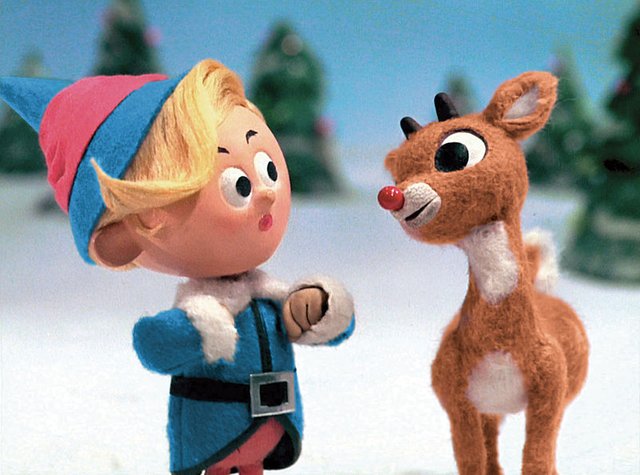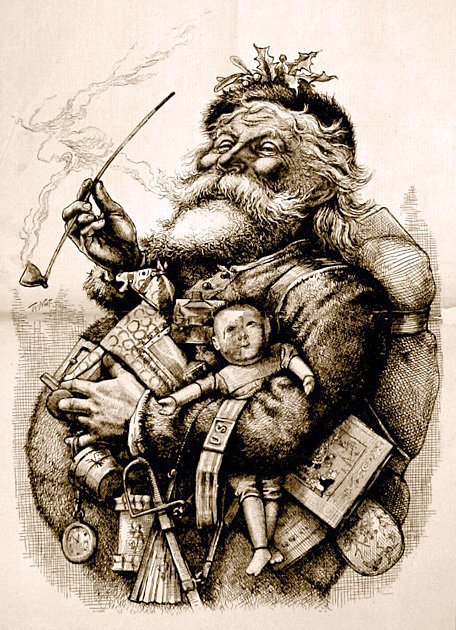Is it immoral to lie to your kids about Santa Claus?
I cannot remember ever really believing in Santa Claus as a kid. I just kind of went along with the whole thing, and I think my parents also knew that I didn't fully buy it.
It was fun watching them try to convince me, and I think perhaps I felt their love for me in the efforts to create a magical, more Christmas-y atmosphere.
One of my friends on Facebook (and also a fellow Steem-head--@danilo-cuellar--) posted his thoughts on the matter today and the conversation it has elicited in the comment thread is quite intriguing. Danilo says that, basically, life is wondrous enough, in and of itself, without fabricating stories about magical fat men that don't exist bringing presents to everyone every year, and that to lie and break the trust of our children is unethical and immoral. I hope I am presenting his position here correctly.
Danilo is a fellow peaceful parent. I was troubled by his post not because I necessarily disagreed (I do think honesty and not breaking the trust of our progeny is extremely important) but because I didn't know whether or not I agreed or disagreed at all. The fence isn't a place I am comfortable sitting, for very long.
As I'm chewing on this now I am wondering, is letting your kids have a little fun with Santa and Rudolph and the whole myth and Christmas feeling really that bad? Why do we put pretty lights up on our houses and decorate the house with images of smiling snowmen and flying reindeer? Those pretty lights give everything a glow that is also not really natural, but are our human way of producing a kind of beautiful and magical state.
I am reminded of the value of myth, and of story.
Rudolph didn't fit in because of his nose, and Hermey the elf wanted to be a dentist, and was unhappy making toys. They were both rejected by society as "misfits." My son has already, I'm afraid, felt the sting of living in a largely homogenous culture while being "different." You see, he's a "half," or hafu. That's what they call kids here in Japan who have fathers or mothers from different cultural backgrounds. He loves the 1964 Burl Ives clay-mation story of Rudolph. I think watching this helps him see that it is okay to be a "misfit," and to always go one's own way, and be true to one's self, regardless of what others might say or do to discourage this integrity.

So, what of Santa? How could that story be of any value?
Hmm. Well. That is a good question. But then again, what value do Christmas trees have? Twinkling, sparkling lights? Christmas carols? What value do any of these have? Snowmen? These are not "real life." My kid loves to sing Santa Claus is Comin' to Town. Does he feel scared of Santa judging him to be "bad?" It certainly does not seem like it. Songs. Dances. Melodies. These are also creations, or..."fabrications," if you will, of the human spirit and mind. They are part and parcel of what we call life. I think the problem Danilo sees, and where I would agree with him is that telling your child something is 100% real, and also pretending to believe in it a as an adult, yourself, is deceit. This is lying, and not the same as a simple story about Rudolph.
It is also, in my view, severely detrimental to threaten your child with punishment/reward systems.
I also fucking hate the whole "naughty" or "nice" thing and kids being threatened to "be good" just so they will get their presents. This teaches kids to salivate for rewards and to be phonies until the cameras are off, instead of helping them to develop a well-rounded sense of values based not on cheap punishments or rewards, but on a healthy and positive self-respect and self-image. But then again, like with my son, I let him know he is loved and make jokes about "naughty" kids and "nice" kids, letting him know the gravity with which I view the whole thing is extremely negligible. We are just having fun.
![]()
Don't f&#$ with Santa, bro. I'll kill you. ~St. Nicholas
So, my final take?
Santa is fun sometimes, and depending on how the topic is addressed, the story can also be very, very moving. Watching the movie Elf with Will Ferrell always makes me cry. There is something so powerful about all those people singing just outside of Central Park, while Santa's sleigh struggles to take off, and a bitter old man finally comes back to himself, to his child's heart, and begins to sing You better watch out... The spirit of goodness and belief and the shared brotherhood and sisterhood of humanity that powers Santa's sleigh around the world to bring presents to all. Maybe I am getting too damn sappy now. Watch it yourself. You will cry if you are alive.
I guess, though, that the story in Elf, with the allegory of the mechanical and forced (the sleigh's jet engine) set against the spontaneous and pure (the Christmas spirit and Christmas carolers) is more substantive and profound than the traditional 2-dimensional Santa story. Maybe that's why I cry.
If my son asks, I will of course tell him the truth. I am just not sure any sort of revelation is necessary. I am not sure he even believes the story. I don't go out of my way to force it.
Fuck. After writing all of this, I am still on the fence. What do you guys think? I think I am leaning toward not carrying cultural torches I really have no interest in passing on. I need everything I do be from my heart. Half-assedly pretending to believe in Santa Claus and telling my kid it is all real truly is not that. And it is kind of dishonest. Especially since I escaped my religious programming and never force any of that kind of bullshit upon him.

Here are some professional psychologist takes on the issue, from Santa's Wikipedia page:
The adults they count on to provide reliable information about the world introduce them to Santa. Then his existence is affirmed by friends, books, TV and movies. It is also validated by hard evidence: the half-eaten cookies and empty milk glasses by the tree on Christmas morning. In other words, children do a great job of scientifically evaluating Santa. And adults do a great job of duping them.[120]
— Jacqueline Wooley
Woolley posited that it is perhaps "kinship with the adult world" that causes children not to be angry that they were lied to for so long.[120] However, the criticism about this deception is not that it is a simple lie, but a complicated series of very large lies.[121] Objections include that it is unethical for parents to lie to children without good cause, and that it discourages healthy skepticism in children.[121] With no greater good at the heart of the lie, some have charged that it is more about the parents than it is about the children. For instance, writer Austin Cline posed the question: "Is it not possible that kids would find at least as much pleasure in knowing that parents are responsible for Christmas, not a supernatural stranger?"[121]
Others, however, see no harm in the belief in Santa Claus. Psychologist Tamar Murachver said that because it is a cultural, not parental, lie, it does not undermine parental trust.[122] The New Zealand Skeptics also see no harm in parents telling their children that Santa is real. Spokesperson Vicki Hyde said, "It would be a hard-hearted parent indeed who frowned upon the innocent joys of our children's cultural heritage. We save our bah humbugs for the things that exploit the vulnerable."[122]
Dr. John Condry of Cornell University interviewed more than 500 children for a study of the issue and found that not a single child was angry at his or her parents for telling them Santa Claus was real. According to Dr. Condry, "The most common response to finding out the truth was that they felt older and more mature. They now knew something that the younger kids did not".[123]
https://en.wikipedia.org/wiki/Santa_Claus
Hit me in the comments, guys. I think this is a conversation worth having.
~KafkA
Graham Smith is a Voluntaryist activist, creator, and peaceful parent residing in Niigata City, Japan. Graham runs the "Voluntary Japan" online initiative with a presence here on Steem, as well as Facebook and Twitter. Hit me up so I can stop talking about myself in the third person!




We came clean with our sons when they were still pretty young, maybe 5 and 7. The older one took it sort of matter-of-factly. He's the more stoic one anyway. But maybe he just wasn't surprised.
The younger one cried. After trying to console him for a bit, he told us that he wasn't crying about Santa. He was crying because we'd lied to him.
When our first grandchild was getting old enough to talk about these things, I asked my son where Santa was in their children's lives. He said that there was no Santa in their lives.
Not on the fence. :)
Wow. That's rough, man, and a powerful anecdote. The betrayal of trust. Thanks for the comment. This Christmas may be a good time to break it to my son gently, as he hasn't really had any time to get into the myth too much. As I said, I am kind of half-assed about the whole thing anyway, and treat the topic almost as a silly story or joke sometimes, so I wonder what he really thinks/believes.
I will not tell my children that Santa is real. They are 12, 8 and 5.
My parents told me and my siblings that Santa is not real.
My mother had a bad experience and decided never to do that to us children.
When she was a child she believed her parents that Santa was real ... the kids at school were starting to tell her he wasn't real, so she went and asked her mom again and my grandmother said that Santa was indeed real. So she went back to her friends and said that mother said it is true and he is real, so you are wrong. Eventually she realized that her mother had lied and she was crushed.
To me it is indeed lying.
Why would my children believe anything else that I say if I lie about that?
I suppose I look at it a little differently. To me it's not that Santa Clause isn't real, it's just that your parents are Santa Clause. I'm not sure how long or if I ever believed in Santa but I know I knew the truth by the time I was in Kindergarten. I don't remember ever being upset about it and I think it is pretty harmless.
As far as the naughty/nice thing, it's just another way of punishing bad behavior which I think parents should do although perhaps santa shouldn't be used as a crutch quite so often.
And let's not forget the Easter Bunny and Tooth Fairy :)
I love this notion. I was just talking with my wife about this exact thing the other day. Great sentiment!
Agreed.
I don't think my parents ever tried to tell me Santa Claus was real, and I don't remember ever believing he was. I think it is cruel to tell kids a lie like that, especially when the parents know perfectly well that the lie will be found out in a few short years.
I wouldn't say that it is "immoral" exactly.
It is about whether you want your children to fully trust you.
If one were to think carefully, there are probably many other things that most parents lie about or trick their children about too.
The parents think that it is for their child's own good so it is acceptable or even necessary to deceive them.
I take a different approach to parenting and to children.
This post has been ranked within the top 80 most undervalued posts in the second half of Dec 23. We estimate that this post is undervalued by $3.59 as compared to a scenario in which every voter had an equal say.
See the full rankings and details in The Daily Tribune: Dec 23 - Part II. You can also read about some of our methodology, data analysis and technical details in our initial post.
If you are the author and would prefer not to receive these comments, simply reply "Stop" to this comment.